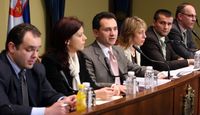- Serbia
Get to know Serbia
- Citizens
Culture and science
Health services
Pension and disability insurance
- Business
Employment
Economy
- Media
- Government
- Contact
Keep in touch
Contact form
Back
Keepin touch
Whether you have a question, comment, suggestion or any problem in the purview of the government, send us your message and we will try to respond as soon as possible. If your problem is not in our purview, we will forward your message to the relevant institution.
Q:
A:
SAA key stability element for foreign investors
Belgrade,
30 April 2008
Serbian Deputy Prime Minister Bozidar Djelic stated today that the Stabilisation and Association Agreement (SAA) is the key element of stability for all those who intend to invest in Serbia, because it ensures long-term economic stability.
At a press conference held at the Serbian government, Djelic said that by signing the SAA, Serbia has ensured its European future and acquired considerable trade benefits when it comes to investments and exports.
According to him, the first direct effect is the signing of a memorandum of strategic partnership, signed today in Belgrade between Italy’s Fiat and Kragujevac-based Zastava.
He also explained that the annual sugar export quota is now guaranteed to be 180,000 tonnes and the export quota for beef is guaranteed at 8,700 tonnes a year.
He said that for the first time Serbia has been given a guaranteed quota for the export of wine to the EU, which will be 63,000 hectolitres a year, whereas the fishing industry has be given additional incentive in the form of a guaranteed quota to export 15 tonnes of trout and 60 tonnes of carp a year.
Djelic also stressed that the SAA fully respects Serbia’s territorial integrity, which is guaranteed by Article 135 of the agreement.
He emphasised that thanks to the SAA, the road to a full abolishment of visas for the EU has been accelerated, and that the majority of EU states support Serbia’s initiative for the abolishment of the €35 fee for issuing a Schengen visa.
He also voiced belief that having signed the SAA, Serbia will join the EU in four years.
Djelic reiterated that the signing of the SAA was a major patriotic act by those present in Luxembourg yesterday and added that the SAA and the accompanying transitional agreement came into effect immediately upon signing, but added that their implementation will depend on the future government’s cooperation with the Hague Tribunal and on the report by the Tribunal’s Chief Prosecutor Serge Brammertz.
One part of the SAA, which was distributed to the press at the conference, states that the SAA will not be in effect in Kosovo and that it does not question the current status of the province, or determines its final position towards Resolution 1244.
According to him, the first direct effect is the signing of a memorandum of strategic partnership, signed today in Belgrade between Italy’s Fiat and Kragujevac-based Zastava.
He also explained that the annual sugar export quota is now guaranteed to be 180,000 tonnes and the export quota for beef is guaranteed at 8,700 tonnes a year.
He said that for the first time Serbia has been given a guaranteed quota for the export of wine to the EU, which will be 63,000 hectolitres a year, whereas the fishing industry has be given additional incentive in the form of a guaranteed quota to export 15 tonnes of trout and 60 tonnes of carp a year.
Djelic also stressed that the SAA fully respects Serbia’s territorial integrity, which is guaranteed by Article 135 of the agreement.
He emphasised that thanks to the SAA, the road to a full abolishment of visas for the EU has been accelerated, and that the majority of EU states support Serbia’s initiative for the abolishment of the €35 fee for issuing a Schengen visa.
He also voiced belief that having signed the SAA, Serbia will join the EU in four years.
Djelic reiterated that the signing of the SAA was a major patriotic act by those present in Luxembourg yesterday and added that the SAA and the accompanying transitional agreement came into effect immediately upon signing, but added that their implementation will depend on the future government’s cooperation with the Hague Tribunal and on the report by the Tribunal’s Chief Prosecutor Serge Brammertz.
One part of the SAA, which was distributed to the press at the conference, states that the SAA will not be in effect in Kosovo and that it does not question the current status of the province, or determines its final position towards Resolution 1244.
-
 Belgrade, 22 January 2025
Belgrade, 22 January 2025Egypt one of Serbia’s closest partners on international stage
-
 Belgrade, 9 July 2024
Belgrade, 9 July 2024Support for 104 associations in diaspora that preserve Serbian language, culture
-
 Belgrade, 15 April 2024
Belgrade, 15 April 2024Competition for StarTech grants open until 31 May
-
 Belgrade, 2 October 2023
Belgrade, 2 October 2023Serbia respects Resolution 1244 and will do everything to preserve peace
-
 Belgrade, 13 September 2023
Belgrade, 13 September 2023Day of Serbian Unity to be celebrated outside borders of Serbia, Republika Srpska for the first time
-
 Belgrade, 8 August 2023
Belgrade, 8 August 2023RSD 24.2m in state aid paid out to citizens affected by storm
-
 Belgrade, 17 June 2023
Belgrade, 17 June 2023Belgrade is doing everything to preserve peace in Kosovo and Metohija
-
 Belgrade, 15 June 2023
Belgrade, 15 June 2023Slovenia will continue to support Serbia on its way to EU
-
 Belgrade, 5 May 2023
Belgrade, 5 May 2023Emergency measures, tightening of conditions for possessing weapons
-
 Belgrade, 3 May 2023
Belgrade, 3 May 2023Three days of mourning in Serbia over tragedy at Vladislav Ribnikar primary school

